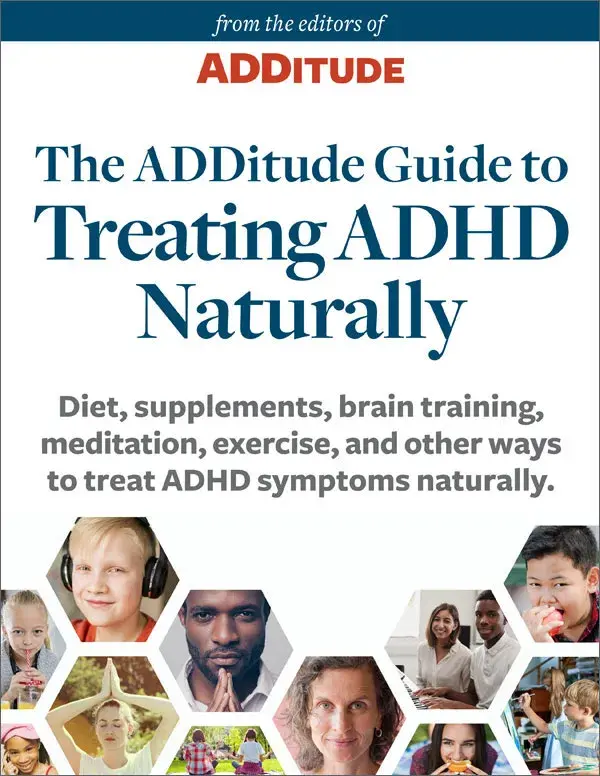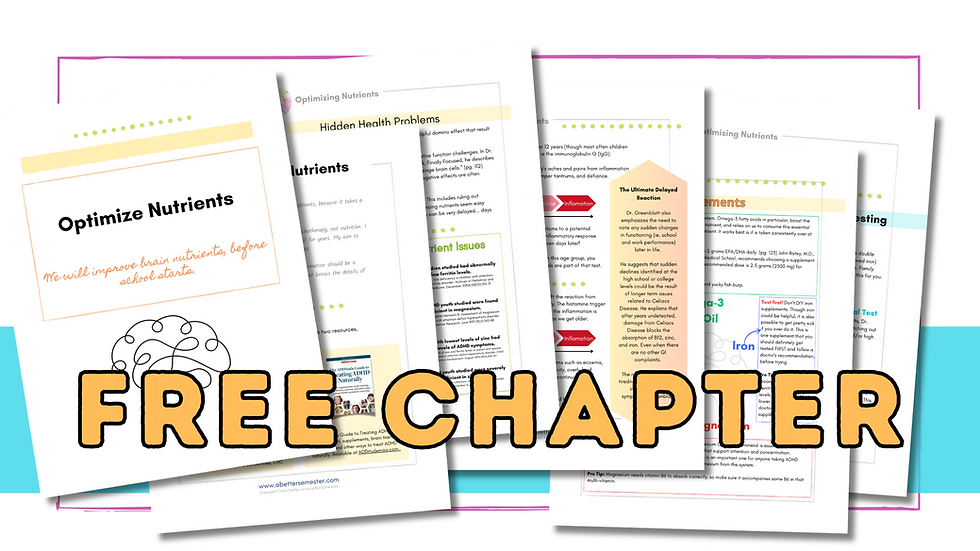Improving Nutrients for ADHD Kids
- Cristin Mullen

- Jun 29, 2025
- 6 min read

Early July is a great time to start optimizing nutrients, because it takes a few weeks to see the results.
A word of caution though. My training is in psychotherapy, not nutrition. I have researched the impact of nutrition on ADHD for years. My aim to relay the most commonly recommended first steps.
As always, none of these strategies, nor this information should be a replacement of advice from a qualified provider that knows the details of your particular situation.


"Though most of us strive to eat and feed our children a balanced diet that helps our bodies maintain healthy levels of key nutrients, in some cases, eating well is not enough. Research finds that people with ADHD may be naturally deficient in some critical nutrients. "
The following information is a summary of information primarily from two resources, that I highly recommend:
Finally Focused: The Breakthrough Natural Treatment Plan for ADHD That Restores Attention, Minimizes Hyperactivity, Helps Eliminate Drug Side Effects, by James Greenblatt, M.D., and Bill Gottlieb, CHC
ADDitude Guide to Treating ADHD Naturally: Diet, supplements, brain training, exercise, and other ways to treat ADHD naturally. Available at ADDitudemag.com.
Hidden Health Problems
Hidden nutrient issues and/or hidden allergies create an unhelpful domino effect that results in biological stress and low-grade inflammation.
A multitude of studies have linked inflammation to executive function challenges. In Dr. James Greenblatt’s life-changing book, Finally Focused, he describes low-grade inflammation as “the chronic cellular fire that can singe brain cells” (pg. 112). However, hidden allergies are tough to detect because the negative effects are often delayed.
We need to do what we can to reduce or avoid inflammation. This includes ruling out potential allergies and balancing nutrients. While balancing nutrients seems easy enough, detecting allergies can be tricky. Inflammatory reactions can be very delayed—sometimes by days or even weeks.
Hidden Allergies
Hidden allergies, or "sensitivities" aren't automatically tested by primary care physicians. The medical model tends to focus on acute issues instead of underlying systemic issues. This doesn't mean you can't request the test though.
Hidden allergies are important to rule out. These allergies trigger the antibody immunoglobulin E (IgE) which triggers the release of histamine. Histamine creates inflammation.
According to Dr. Greenblatt, the bodily reaction to allergens are slightly different for kids 0-6 years of age vs. 12 years of age vs. adults.
The IgG Reaction

Happening most often in children six years or younger, but also up to 12: During this stage of development the body's aches and pains from inflammation include headaches, tummy aches, temper tantrums, and defiance.
This reaction is tough to logically connect to an allergen because it has a huge delay. The inflammatory response doesn't create the problems until hours, or even days later!
At this age, the body reaction to a hidden allergen tends to create the immunoglobulin G (IgG) in reaction to allergens. If you seek testing for a kiddo within this age group, you might have to double check that the IgG levels are part of that test.
The IgE Reaction

At some point, our bodies shift the reaction from releasing the IgG antibody to the IgE antibody. The histamine trigger and inflammation remain the same. However, the inflammation begins to affect our bodies differently as we get older.
Now, we start to see some results from long-term inflammation, such as eczema, sleep issues, ear infections, asthma, mood reactivity, overly loud talkativeness, executive function issues, and continued tummy troubles.
Again, if you'd like to rule out allergens, you'll need to double-check that the IgG antibody is part of the test.
The Ultimate Delay
Dr. Greenblatt also emphasizes the need to note any sudden changes in functioning (e.g., school and work performance) later in life. He suggests that any sudden declines identified at the high school or college levels could be the result of long-term issues related to Celiac Disease. Dr. Greenblatt explains that after years of being undetected, damage from Celiac Disease blocks the absorption of B12, zinc, and iron, even when there are no other GI complaints. The results are extreme tiredness, depression, and increased ADHD symptoms (Greenblatt, 106-107).
Hidden Nutrient Absorption Problems
Studies show...
Both of the above resources point towards the following nutrients as a good start towards nutrient improvements.
Omega-3 Fish Oil
Fats coat, protect, and improve the entire nervous system. Omega-3 fatty acids, in particular, boost the production of dopamine. The body cannot make this nutrient and relies on us to consume this essential ingredient (ADDitude, pg. 32). This is a long-term nutrient. It works best if taken consistently over at least 6 months.
Magnesium Glycinate, Citrate, or Gluconate
This mineral is essential for the myelin sheath that surrounds brain cells, supporting attention and concentration. Magnesium also has a calming effect on anxiety. It is particularly important for anyone taking ADHD medication.
Zinc
This mineral is involved in the regulation of dopamine and is believed to make ADHD medications more effective (ADDitude, pg. 36). Dr. Greenblatt also notes that low zinc levels can interfere with the effectiveness of ADHD medications (pg. 61).
Iron
Test first! Don't DIY iron supplements. Though iron can be helpful, it is also possible to get quite sick if you overdo it. This is one supplement that you should definitely get tested for and follow a doctor's recommendation before trying.
Honorable Mentions
Though the above three supplements, I do see recommended most often, there are a few supplements worth looking into. These honorable mentions are nutrients that I have seen recommended and witnessed positive effects with both my own children and my clients.
Melatonin - Timing is important because there can be a rebound effect after the 30-45 minute mark. Aim to give melatonin about 20 minutes before your child is in bed with the lights out.
Nutritional Lithium - Personally, lithium has been a life-changing supplement for my hyperactive and struggling child. The FDA states that she should be getting 3 mg of lithium per day from our tap water and food. Not all tap water contains that much, and many of us drink filtered water. Some brains really need this essential mineral. If you have a child struggling with aggression towards themselves and others, look into chapter 3 of Dr. Greenblatt's book, Finally Focused."
Methylfolate - The man-made version of methylfolate is folic acid. Some of us don't handle folic acid well. When you pick out a multivitamin, be sure it has methylfolate instead of folic acid.
Consider Testing
A simple place to start is to request a "CBC Panel" to measure essential nutrients, as well as allergy and food sensitivity tests. Dr. Greenblatt recommends double-checking that Ferritin (stored iron) levels are included in these tests. Family doctors should be able to order these tests.
If you'd like to investigate further, Dr. Greenblatt provides extensive guidance on which tests to get and where to get them in his book, Finally Focused.
Never Stop Learning
If this article sparks interest for you, I recommend looking into the following topics as your next steps. Optimizing our health creates gradual, gentle results, while also improving our ability to benefit from ADHD treatments.
Sleep - ADHD Children are 89% more likely to have sleep-disordered breathing. (8)
Gut Biome - More and more studies are surfacing that confirm the gut to brain effect. There appears to be a direct connect between our gut biome and our mental health. (9)
Body Movement - Our kids move. They move because they need to. Their brain needs them to move. Exercise releases biochemicals that evens out mood, pleasure and pain. All three areas which ADHD brains content with on a daily basis.
Resources:
Bellanti JA. 59th annual meetings of the American College of Allergy, Asthma, and Immunology. 2001.
Egger J, et al. Controlled trial of oligoantigenic treatment in the hyperkinetic syndrome. Lancet. March 9, 1985; 1(8428):540-45.
Niederhofer H. Association of attention-deficit/hyperactivity disorder and celiac disease: a brief report. Primary Care Companion for CNS Disorders. 2011;13(3).
Konofal E, et al. Iron deficiency in children with attention-deficit/hyperactivity disorder. Archives of Pediatrics and Adolescent Medicine. December 2004;158(12):1113-15.
Kozielec T & Starobrat-Hermelin B. Assessment of magnesium levels in children with attention deficit hyperactivity disorder (ADHD). Magnesium Research. June 1997;10(2):143-48.
Toren P, et al. Zinc deficiency in attention-deficit hyperactivity disorder. Biological Psychiatry. December 15, 1996;40(12):1308-10.
Oner O, et al. Effects of zinc and ferritin levels on parent and teacher reported symptom scores in attention deficit hyperactivity disorder. Child Psychiatry and Human Development. August 2010;41(4):441-47.
Chervin RD, et al. Sleep-disordered breathing, behavior, and cognition in children before and after adenotonsillectomy. Pediatrics. April 2006; 117(4):e769-78.
Mayer EA, et al. Gut microbes and the brain: paradigm shift in neuroscience. Journal of Neuroscience. November 12, 2014;34(46):15490-96.








